#something something reuse of tried and true narratives and tropes
Explore tagged Tumblr posts
Text
The fanfic post I just reblogged has got me thinking. I say this as someone whose understanding of fanfic and the surrounding culture is 0% participation and 100% observation, but it strikes me that there are strong parallels, if not a joint root cause, between small-scale fanfic culture, mid-scale books being marketed using fanfic-derived tropes and terms, and the large-scale trend in movies and tv towards remakes/reboots/spin-offs/sequels of existing IP. From my perspective these phenomena appear to feed into/off of each other, but again without having personal experience in any of these fields this is is largely informed speculation.
But! I’d love to hear from anyone who has more personal experience with any of these areas and their thoughts on the matter.
#fanfic#media#publishing#anthropology#?#first person#it’s something something broadcast vs popular#something something reuse of tried and true narratives and tropes#something something monetizing the popular and deconstructing relative high culture#I feel like I’m circling the conclusion but can’t quite find it
0 notes
Text
The Characters of Nisioisin (2)
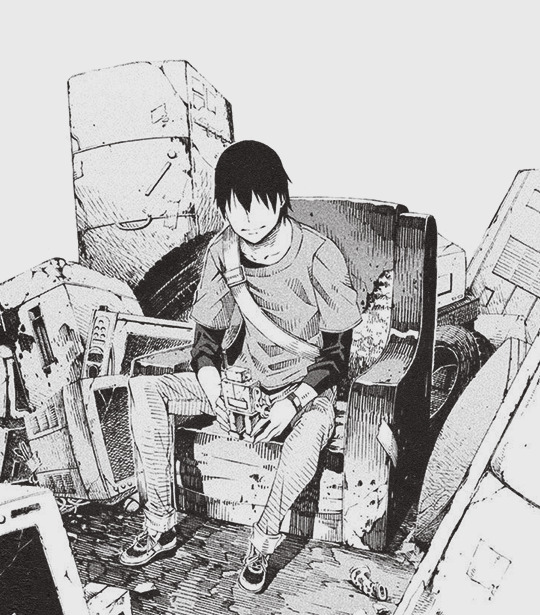
Trickster - Ii (Boku)
This is a post in an ongoing series about the common character archetpyes used by Nisioisin. If you want more information check out the previous post, here. Consider this a part two of that same post. Today we’ll be looking at the nonsense user, and deceiptful protagonist from the aptly titled series “Zaregoto” or in english “Nonsense”.�� More underneath the cut.
I established the four criteria we are going to be dividing this post into in the previous post, as well as introducing what the idea of the trickster archetype is. Using Kumagawa as the UR-example we’re going to compare Ii-chan with those same tropes.
Introduced as a Villain
Subverts Expectations
Lying, Liar who Lies
Inherent themes of Nihilism
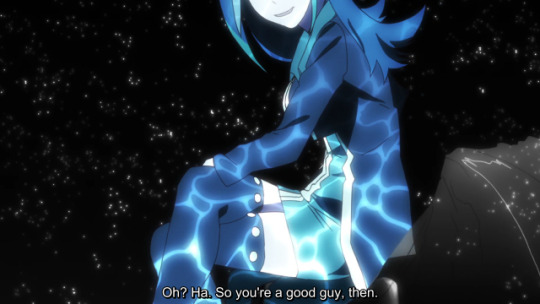
1. Introduced as a Villain
So, next Iichan. He's a special case out of these three because he's actually the series protagonist. But he still kind of fits the criteria because in his series the basic premise of every book is that iichan goes somewhere and a murder happens and then he tries to solve the murder for like the whole book and he sort of kind of solves it and then Jun Aikawa whose much more of a "hero" character than him, the coolest, sickest, strongest detective ever shows up out of nowhere and lectures him.
The sort of conflict set up between Ii-chan and Aikawa as two detectives of the story reminds me of a quote by Maiji Otaro, author of Jorge Joestar (among other things).
“Two detectives, one true. If both are detectives, then both must arrive at the same truth. But does that happen in the novels of this world?” “Most novels with two detectives have one solve it and the other discover the real solution hidden behind it.”
“At that point, are they both still detectives?”
“Hmm.. they’re treated like detectives but certainly, within that novel, the latter is the real detective. But they might switch places in the next novel.”
(Jorge Joestar).
Ii-chan is never introduced as an antagonist from the start of the series he is and always is the narrator. However, he’s still introduced as something he is not. Kumagawa is introduced as a villain and goes on to become a deuteragonist. Iichan is a main character but he doesn’t affect the story like a main character ought to, nor does the story really revolve around him.
So there’s still an inherent lie to his introduction. He is introduced as the center of the story but he is not the story’s real center. However, there’s another subversion implicit in Iichan’s character from the first novel to the second novel.
The first novel is the one where Iichan plays the role of the detective the most straightforwardly. He figures out the trick, solves the case, corners the murderer, but doesn’t solve it all the way and gets lecture by Aikawa at the end. However, there’s a strange way that all the characters react to Iichan despite the fact that he constantly makes himself out to be just a completely harmless, and incapable normal guy.
“Ther’s no meaning. Just like there’s no meaning in your actions. You know, you’re, wow, so you’re the kind of guy who’ll get angry for the sake of a complete stranger. That’s not a very good thing. It’s not bad per se, but it’s not good. [...] That’s because people who can expose their emotions for the sake of someone else are the same people who blame things on others when something goes wrong. I despise people like you.
It had to be the first time in quite a while that someone had spoken that harshly right to my face. Slowly, she brought her glaring gaze to meet my eyes.
“You just let yourself get carried along by other people. You’re the type wo ignores traffic lights just because everyone else is doing it. You’re an abomidable excuse for a human being. They often say ‘Harmonize without agreeing’ but in your case, young man, it’s like you’re agreeing without harmonizing. I won’t say that’s bad. I won’t say anything as to that. One’s identity and worth are not always connnected. A train that runs along a track is better than a train that doesn’t. So I won’t say anything as to that. But I hate people like you. I despise them. People like you always blame things on others, never acknowledging their own responsibility.”
Ii-chan as a character who is introduced as harmless, and passive, never making any choices until we are shown explicitly in the second book that he is not. It’s with his choices in the second book that his true character is revealed.
2. Subverts Expectations
Though for Ii-chan it should really be “avoids any and all expectations.” The Zaregoto is a series that continually asks if the actions of its protagonist are meaningless or not. If any action that Iichan takes effects the outcome of the story in any way.
In Strangulation Romanticist, Ii-chan gets involved with a group of friends who all end up dead or in prison by the end of the story. The central question is what role did Iichan play. Here are some things Ii-chan does in the book, meet with a serial killer and then lie to cover up a police investigation and a private investigator tracking him down giving him time to kill more people, destroys police evidence of another investigation, taunts one girl who murdered another girl into killing herself to atone, knew another murder that was going to take place and did nothing, and then taunts a second girl who wanted to kill herself into killing herself who only survived because the police talked her off a ledge.
“Charges? What charges?” “Falsifying information in regards to the Emoto case, encouraging Aoii’s suicide, not to mention concealment of evidence, plus withholding information and having that little rendezvous with Atemiya. Normally they’d have your ass for that, which I’m sure you’re well aware of, but I’ll take care of it for you. Althought, I suppose even if I didn’t Kunagisa probably would...” (Zaregoto Volume 2)
Therefore, Iichan is someone who acts but doesn’t really face any real consequences for his actions, and that’s because he’s a master of avoidance.
In psychology, avoidance/avoidant coping or escape coping is a maladaptive coping mechanism characterized by the effort to avoid dealing with a stressor. Coping refers to behaviors that attempt to protect oneself from psychological damage.
Iichan is subverting a lot of expectations. He is the protagonist, but the story is not about him. He goes through all of these stories, but he doesn’t ever seem to grow or change from them. He’s a detective, but he never really solves the case or even cares that much about reaching the real truth. He’s written to be a subversion of everything the main character of a detective novel should be.
However, Iichan is also very aware of how a detective should act and deliberately playing with and subverting those tropes. Not only does he subvert the expectations of the reader, but also of the characters around him. He is avoidant, in that way it means he avoids any kind of contfrontation.
I didn’t hate losing. I hated compettition. I was thoroughly put off by the idea of vying for others over something. I hated fighting as well and thus never made friends.
This is a line that gets reused for Kumagawa as well.
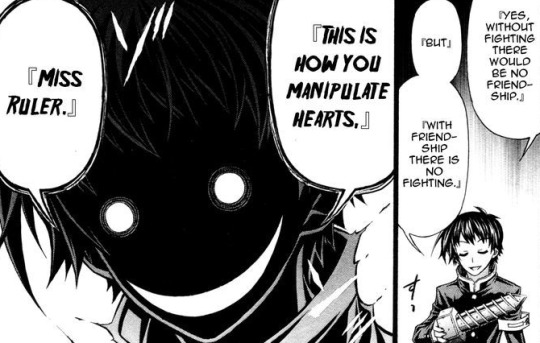
Which helps to illustrate the difference between them. Let’s say there is a problem, Kumagawa will charge head first at the problem and it will explode in his face, and Iichan will do everything in his capacity to never confront the problem or deal with it in any way possible.
Iichan is deliberately aware and sensitive to the expectations of the other people around him, and he feels like he will always be too inferior to fulfill them so he doesn’t even bother to try.
“I have been doing so.” I said. “But you know I have limits, too. It seems like everyone and anyone harbors some sort of expectations from me, and of course I would love to meet their expectations, too, but I cannot meet the expectations if I lack the capability. So to have someone say you failed my expectations is nothing but bothersome.”
Zaregoto Volume 4.
The way he avoids the expectations of others is rendering himself as ambiguous as possible, which is where we get to the next part.
3. Lying, Liar who Lies
Iichan is an unreliable narrator who never tells the truth in a straightforward manner, and even lies for half of the second volume. However, there’s more than that, there’s a deliberate trick to the lies he tells.
Iichan is someone who defines himself as ambiguously as possible. He acts like someone who others cannot possibly understand. Despite narrating from the first person, Iichan is only comfortable when he is not known by anyone. Iichan acts like someone who is barely present in his own story.
Answers have no real point. They’re vague and ambiguos and unsound, and things that are fine that way. In fact, they’re better. Causing real change is a role that should be left up to the true “chosen ones” outstanding individuals like that scarlet Mankind’s Greatest, and the Blue Savant, it was never my responsibility. It was no job for a common loser. For the comic sidekick.
Zaregoto volume 2.
Once again we see the contrast between Kumagawa and Iichan, if Kumagawa is a character who shows how strong and capable one loser can be, then Iichan often waxes poetically in his narrative about how weak and incapable he is. If Kumagawa is a good loser, than Iichan is a sore one.
Iichan defines himself as ambiguous on purpose to avoid responsibility for his actions. In less fancy words, if nobody can understand Iichan than nobody can call him on his shit. That’s his goal, essentially. He doesn’t want to work hard to change, or be confronted about any of his actions, because for him merely the act of living takes all of his effort to tread water without making any progress.
Avoidance is a trauma response, Iichan spends all of his time distancing himself from his own actions rather than confronting any of it. However, Iichan is more complicated than that because Iichan’s ambiguity has another side effect making him out to be something that he is not.
“Just by being there, you startle others, just by being there, you make people lose their grip on themselves.. ther’re a bunch of people like that. You can’t relax when you’re with them, it annoys you, things don’t go as planned, people like that, you know, they’re even scientifically explainable. In other words the missing part. Because the missing part for the observer ends up looking the same, it feels like the person is having their ineptitude pointed out at them, and it startles them [...] You’re just like everyone, and that picks at people’s subonscious, that’s why you’re aimless. And yet you still manage to come out on top. [...]”
Zaregoto Volume 3
All of these things Jun points out in this scene are Jungian ideas of the trickster. Iichan is an inferior person who seems to exist to point out the inferiorities in other people, and use it to play tricks on them. While viewing him as this role of the trickster, Aikawa is not really treating him like a person. (Aikawa’s very dramatic).
Which is where Iichan finally gets his trick. It’s a trick in two parts. He constantly underplays his own agency, while at the same time overplaying his suffering.
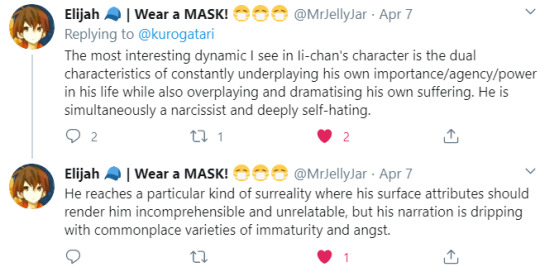
In other words, while insisting that he is the least improtant person on earth, Iichan at the same time hems and haws like the main character of a tragedy. IIichan wants people to empathize with his suffering, and he wants to be important, but he doesn’t want any of the responsibility of being important. He doesn’t want to take any degree of control of himself or others, so he tries to balance himself between these two conflicting ideas.
1) He is not a protagonist, and therefore the events in the story have nothing to do with him. 2) He is the main character of a tragedy. The world is centered around him, he is someone special and important, and that makes him suffer, but he takes no agency in the role.
Doing this he gets the best of both worlds. He gets to always be involved and important to others, while at the same time uninvolved and is never held accountable for his actions. He’s never challenged or forced to grow or change in any way.
These are the two lies that Iichan tells, and those lies form a narrative. Iichan is lying to give a narrative to his own trauma, and therefore try to extract some kind of meaning from it.
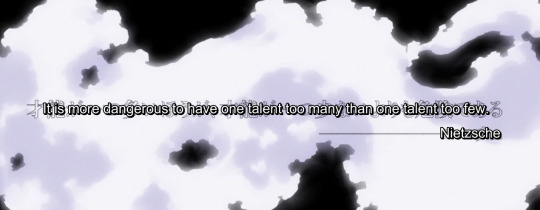
4. Inherent Themes of Nihilism
We once again return to the sacred image.
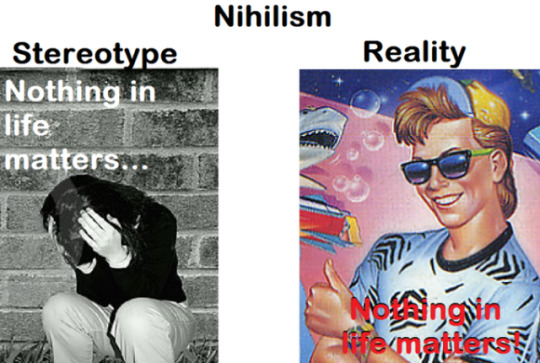
Iichan is a moral nihilist. He’s on the elft side of that image.
Moral nihilism (also known as ethical nihilism) is the meta-ethical view that nothing is morally right or wrong. It is built on three principles.
1. There are no moral features in this world; nothing is right or wrong. 2. Therefore, no moral judgments are true; however, 3. Our sincere moral judgments try, but always fail, to describe the moral features of things.
Iichan’s view is basically that of, if there is no meaning to this world then any attempt to define meaning is pointless. He (let’s say it again class) usually uses this as an attempt to evade any and all responsibility for his actions.
Iichan doesn't want other people to look at him, he doesn't want to be at fault when things go wrong, but he also wants to be important. So he's continually on a tight rope walk with those two very conflicting desires.
So basically Iichan sees no value in his own actions. He sees no value in the world. He doesn't really have any set of morals, except that he thinks murder is bad. Except sometimes he doesn't really care if certain people are murderers. Zerozaki is a murderer and Iichan hates him but doesn’t actually make any sincere attempts to stop him. Kunagisa commits murder in volume 4/5 and Iichan goes out of his way to cover it up. He apparently doesn’t consider goading a girl into suicide to be a form of murder. But at the same time he's so desperately searching for meaning, because he wants to feel fulfilled.
Iichan thinks that talent and genius are perhaps one thing that could give the world meaning. His best friend is a super genius, and he kind of clings to her and is jealous of her because she's someone special. See he thinks there are people whose lives have meaning despite being a pretty blanket nihilist, but because he's not talented he's not one of those people. Talent is something that could possibly give life meaning but being outside of the talented people it makes no difference to him he can only gaze at it from afar
Iichan is someone who is constantly downplaying his own meaning, while at the same time trying to find some meaning vicariously through others, like Aikawa and Kunagisa who he considers to be the real heroes of the world. Despite Iichan insisting there’s no meaning, he also has an attraction to narrative view of the world. Which is something that you know... has meaning, because stories are written with intent and purpose by an author.
In the sixth volume there’s a concept called “The Story” which one character belives that everything is pre-destined, like it’s all some pre-written story. Therefore while you can make small changes in your own actions it never effects the big picture in any way.
This is once again a very convenient idea for Iichan, who avoids responsibility to believe in. He’s very attracted by this idea because it takes control out of his hands and means his own actions aren’t really his fault.
To be honest, this must be one of the most boring conversations to be listening in on. It had gone so far into the conceptual, that even for myself, participating in the conversation, the words of the man with the fox mask seemed as hazy and illusory as a dream. You could say I do not understand what he is saying. However, then why. Then why does what this person says strike so deep? Why does it resonate? [...] Then, no. I do not want any part of such importance. I do not want anything to do with the core of the story.
Here we go with Iichan’s double negative, he denies having any role or agency in the story and yet at the same time believes that such a thing as the story exists because it means to some extent his actions are out of his control because he can’t accept that they are.
Is Iichan’s role in the story ultimately meaningless? No. There are always clear and distinct consequences for his actions. In the same volume (6 - cannibal magical) where the concept of the story are first introduced that everything is predetermined and you can’t change the big picture, the events of the story disprove that assertion.
Iichan is given like, a million warnings not to go to a lab. Aikawa tells him not to go to a lab because she has a bad feeling about it. The literal assassin sent to that lab talks to Iichan and says “Yeah, I was sent here to kill people.” Another person who was in the same situation just walks away from the problem. Iichan sees the assassin going out to kill people in the middle of the night and just chooses to... go to sleep.
Then he wakes up to everyone dead in the morning. The point being Iichan had a million chances to avoid this situation, takes absolutely none of them, and then acts like this was a completely unavoidable fate. He hems and haws about having no choices, but he’s clearly given choices, he just doesn’t take them, or makes exclusively bad ones.
Iichan wants to avoid consequences by not choosing, however the choice to not choose is still a choice in itself. Everything is a choice. Even avoidance is a choice. Which is why Iichan’s actions do actually have meaning, just not in the way he wants them to. He’s not a special person, and he’s not anyone extraordinary, but he is someone who has to face the consequences of his actions no matter how many narrative tricks he pulls to avoid them.
The actual trick of Iichan’s story is that he really is the protagonist, he just doesn’t want to be.
75 notes
·
View notes
Note
How did you create your characters? What was your process?
TMI Tuesday: How did you create your characters? What was your process?
// <offers out a chair> You’re going to want to sit for this. It’s going to be a LONG story. For those who’re looking for a short answer: I’m actually in the middle of creating these two. Edits and tweaks are always being made to make them appear real and true. And it’s thanks to everyone on here and in-game that they’ve progressed so much.
Now for the long version.
<buckles seat belt>
Evolving as an Author:
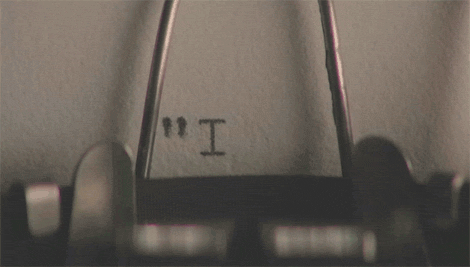
Maxinora and Augustine Parkhurst are a culmination of ideas inspired by a myriad of things. The process of creating them isn’t linear. It has a lot of pit falls, unexpected twists and turns, and a ton of hills. To understand how we got the current versions of these two, we need to go back a couple years ago.
It’s the summer of 2012. In efforts to get me off of his account, my Dad gifted me my own. This was when I made my first ever serious roleplay character- a hunter named Evelon Holmwood. Well, at the time I spelled it like Evavllyn but...Yeah. We’re going to gloss over that fact. Now, Eve was my pride and joy for the last several years. I played this character nonstop, refusing to play or write about anyone else. In retrospect, I used this character more as therapy than anything of creative merit.
Eve’s story was basic at best. But I got better with story-telling the older I got. Unfortunately, her story got so convoluted that I had hard time salvaging anything from it. Now, you’re probably asking: How does this relate to Max? Fear not. I’m getting there. It was around this existential crisis that a mutual friend of my boyfriend and I convinced us to leave WoW and hop on SWTOR. My boyfriend was more than eager to make the switch but I was skeptical. Leaving WoW meant leaving Eve. And was I ready for that?
He assured me I was and helped me make a character on SWTOR. This was the first iteration of Max. A bounty hunter from Nar’Shadda named Maxinora Fenrik. My intentions was to make her a lowkey copy of Eve. At this time, I wasn’t very confident in my writing abilities and liked to stay in my lane. But, the more I roleplayed this character the more she took on a life of her own. She evolved past Eve and exceeded my expectations. Playing a new character bolstered my confidence and while I no longer play SWTOR -due to OOC reasons- I still have fond memories with this character. I enjoyed this character so much that I reused several components of her design when making Max. Some which include her name and being blind in one eye.
I flipped between the MMOs when Legion dropped. Expenses started to pile up and between the two subscriptions I didn’t have the time to play both. In the end, WoW won my affection and I made a Blood Elf because I had friends on Horde Side. Rorien Hawkthorne was her name. A drunk artist and master assassin. She’d be the second iteration of Max. She had an older sister complex, an affinity for being melancholy, and it was my first experience with playing a character who could kept secrets- or tried to at least. Another new character under the belt and I was feeling a little more confident in my story telling abilities. I’d probably would’ve kept playing that character if not for OOC drama happening in a guild I was in. The fallout had me jump back to the Alliance where I indulged in creature comforts. It was back to Eve.
Tumblr made an entrance in my life around then as I ventured forth with a refreshed look on my hunter. I salvaged what I could and made a half-decent story. A lot of her misadventures are still posted up on her blog @evelonholmwood On the side I made the third iteration of Max. A fire mage and blacksmith combo by the name of Rowan Celwick with her younger brother Thomas Celwick. They were just two orphaned kids trying to make a life in Stormwind. Rowan was an arcane drop-out and blacksmith wannabe and Thomas...Was...Well? Thomas? A glorified side-piece? A way to garner pity for Rowan. I didn’t place a lot of emphasis on them or their characters. My main focus was Eve. But these two would be the underlying foundation of Max and Auggie’s characters.
I eventually took a hiatus from WoW and focused on more personal writing. The details are boring so I’ll gloss over it by saying that creating a character completely from scratch was the final push in the right direction for me. Fast forward several months to a year aaaaaand BOOM! Pandemic.
Writing is an escape for me. It’s one of my best coping mechanisms during trying times. And when nothing else works, I over indulge in some Warcraft. So, I resubbed. There was hesitance when re-entering the RP scene. I didn’t leave Eve’s story off on an convenient note. For lack of better phrasing, I wrote myself into a hole I couldn’t get out of. So, with the help of my boyfriend, I decided it was time to give Eve her happy ending and shelf her for good.
Which put me in a dilemma! Who was I going to RP? Well, you remember the Celwicks? They became my newest project.
The Creative Process:

I knew the Celwick story was weak and read much like a middle-school fanfiction. Revising was a must. But there were integral pieces to their story which I enjoyed:
Familial Sacrifice
Juxtaposing concepts
Intertwined Fates
These were themes I could work with and evolve. Keeping these in mind, I started to deconstruct the Celwick story line. They were no longer Gilnean but Kul’tiran. This prompted a name change from Celwick to Parkhurst. And I won’t lie, I like the sound of Parkhurst better than Celwick. Thomas became Augustine and Rowan became Maxinora (Mainly because I actually HAD the name Maxinora and not Rowan). The little changes got me hyped for the characters.
Next, I started to trim away the unnecessary details that bogged down the narrative. Things that either didn’t fit or made the timeline too convoluted were replaced. Pyromancy was a great example. The age I wanted Max to be wouldn’t yield to her understanding of Pyromancy. At least, not to the level I WANTED it to be. SO, I turned it into lament’s magic. Alchemy. (I also always wanted to play an alchemist since watching FMA)
A girl with two professions seemed excessive as well. I had to look at why I wanted her to be both an Alchemist and a Blacksmith. The answer was simple. I just liked the juxtaposition of an intelligent woman being rough and tumble. Which made me ask: Was Blacksmithing necessary to achieve that imagine? The answer was no. To pay respect to her previous iteration, I made their parents blacksmiths. It also let me keep themes of fire in her concept. The change in profession brought on a change in her appearance. I made her a little more slender to fit with the alchemist appeal.
Max’s aesthetic was brought on by my previous characters. Rorien inspired more internal facets of Max while Fenrik inspired outward appearances. Max’s auburn was strictly a decision made on the fact that I had one too many character’s with black hair. There wasn’t any other reason for it.
Designing Max was easy. The real challenge was with Augustine. Up until that point, all I had to go on for his character was Tommy Celwick and...Well. There wasn’t a lot there. He wasn’t much more than a poorly used trope and I considered doing away with him all together. But I realized that I REALLY liked the trope and I liked what he did for Max’s character. So, I buckled down and made myself think through all the reasons why Thomas Celwick -AKA Augustine Parkhust- needed to exist.
I decided that I needed him in order to present themes in Max’s story. He was the foil to her character. Cynic older sister? Meet optimistic brother. He also appealed to not only the three themes listed above, but also the newest one I wanted to explore: two sides of the same coin. Max and Augustine are simultaneously the same, having similar traumas, and yet different. If for nothing else, Augustine could help propel Max in the right direction. Be her moral compass, you know? With a bit of half-assing here and there, I managed to get a decent character out of Augustine. Took the cliche nerdy brother idea, physical design and all, and ran with it. Shortly after I made their Tumblr account. In no way did I expect this BOY to take on a life of his own. Like, Auggie knocked on my brain’s door and was like, “Yeah. No. I’m not a side character. Give me my own story...”
Which will bring me into my final point!
The Characters Write Their Own Story:

I’ve never been able to sit down and plan a story. My mind doesn’t work in such a structured fashion. It wanders and explores. When I’m creating, I’m watching. Watching the scenes play out before my eyes as these characters take what I’ve given them and grow into something almost independent of me. The basic pieces of Max and Auggie’s back story, along with character design, were purposeful. Yes. But everything that came after was THEM.
It’s cliche, I know, but I can’t describe this experience any other way. These two grew outside of my influence and now dominate a space in my brain. They talk, work, and interact without me. I mean...Not REALLY. But...It feels like that. It feels I’m watching through a keyhole and just recording what I see as their story plays out.
I guess a better analogy is me being the director. I’m watching the movie in the stands as two actors improv. On good days, I’m in control and rework scenes until I’m satisfied with the results. Try this. Move here. Say this. On bad days, I don’t see anything. My actors went home. The lights are off. Show’s cancelled for the day. These days make me sad...But they’re worth it because on the BEST days...The best days Max and Auggie run the whole show, and I am watching through the keyhole as their story unfolds little by little.
It’s truly magical.
The last part of their creation was the voice. Character voice, for me, is like building muscle. You need to work out. Start small and work your way up in weight. Every little piece I wrote made their voices stronger; and that’s including asks and threads. Interacting with other characters helped to flesh them out as people. And while it was hard and intimidating at first, it’s started to become easier.
Wrap-Up
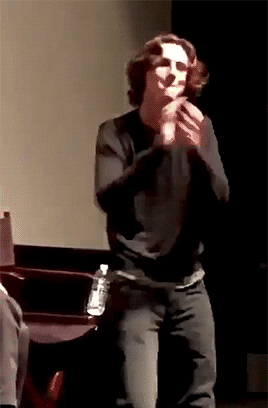
My method is messy and untrained. I don’t claim to have any secrets. My knowledge of writing is mediocre at best. But I’m having fun. And that’s were the real magic of any character comes in. Fun. Because if you aren’t writing about something that sparks your soul- either with love, happiness, hatred, etc- then it’s nothing more than a forced, hollow husk. Writing is meant to evoke emotion. At least in mind. And want to express complex emotions and share them. In a perfect world? My characters -any of my characters- resonates with someone. They become the escape someone needed. That’s the ultimate goal.
It’s thanks to all of you that Max and Auggie have come this far. It’s from their interactions with others that they’ve managed to evolve into something incredible- especially Augustine. He just kept shining brighter and brighter until I felt obligated to make him an in-game character. So, you all are just as much a part in the creative process as me. Thank you!
And a special thanks to my boyfriend for always being a sound board for my rambling ass <3
THANK YOU FOR THE ASK, ANON! Sorry I posted an essay...<3
14 notes
·
View notes